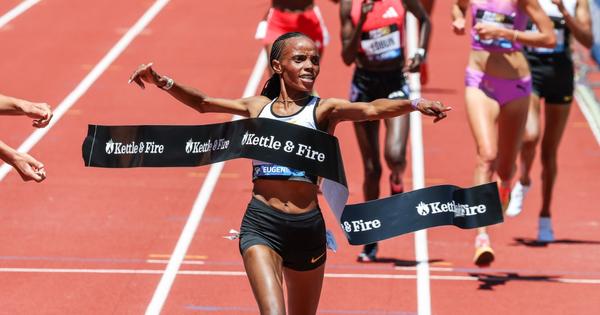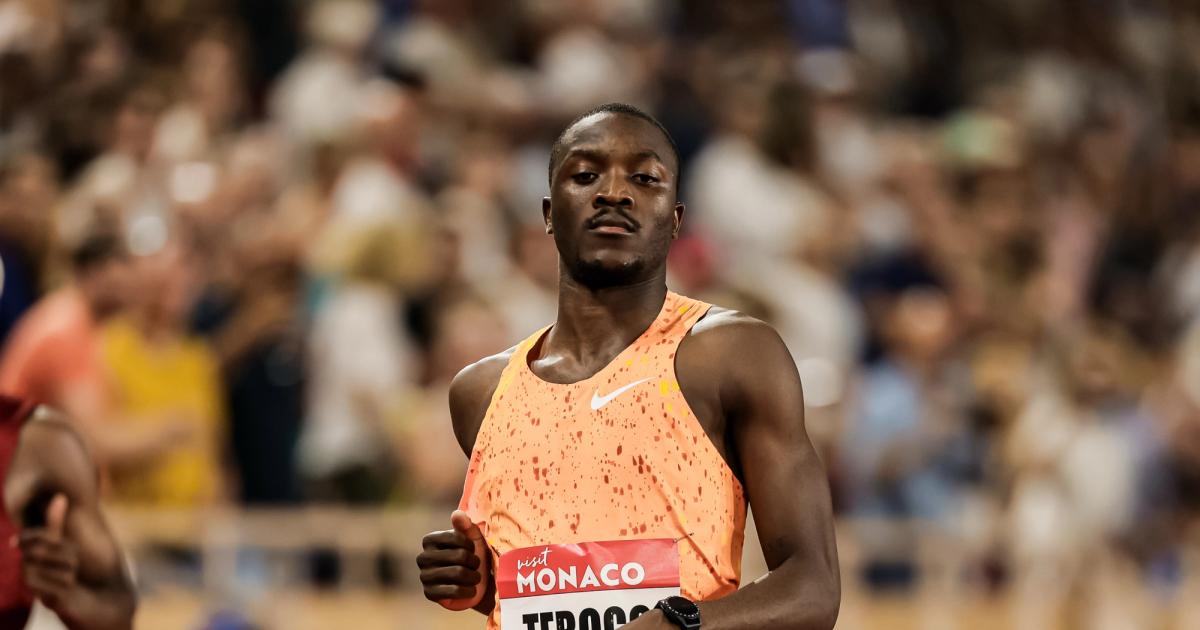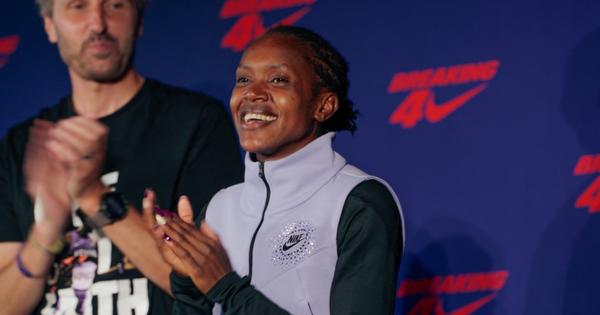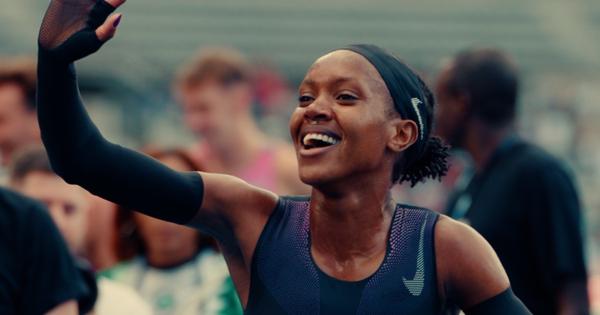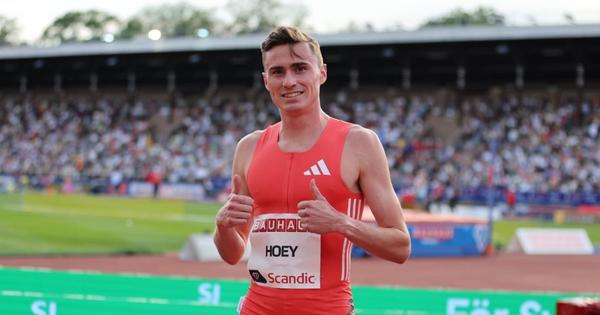By David Melly
July 9, 2025
Was the 50th Prefontaine Classic the best track and field meet ever held?
Statistically, the answer is yes. Vibes-wise… it’s certainly up there. Of course, the biggest headlines coming out of the weekend will be a pair of world records falling in the women’s 1500m and 5000m—rightfully so, as Faith Kipyegon and Beatrice Chebet are generational athletes at the top of their game giving the people exactly what they want.
But we also saw epic performances solidifying Kishane Thompson and Melissa Jefferson-Wooden’s favorite statuses in the men’s and women’s 100m, a shocking come-from-behind win by Niels Laros in the Bowerman Mile, returns to form for Olympic champions Letsile Tebogo and Winfred Yavi, and incredible head-to-head battles in the women’s long jump and men’s 400m hurdles.
Heck, the pre-TV-window events alone could make for an entire weekend’s worth of headlines, with 18-year-old Biniam Mehary outkicking two Ethiopian countrymen for a world-leading 26:43.82 10,000m, Jacious Sears showing she probably belonged in the “A” heat with a 10.85 100m victory, Rudy Winkler dethroning Olympic champ Ethan Katzberg with an American record performance in the hammer throw, and Ethan Strand looking every inch a top-tier international contender with a 3:48.86 mile win in his professional debut.
PRE50 was truly an embarrassment of riches, but that’s what you get when the biggest shoe company in the world bankrolls the best track meet in the United States. 17 Olympic champions from Paris toed the line in Eugene, and although the Diamond League determines a set number of “official” disciplines at each of its events, Pre organizers added another nine professional-caliber events on top of everything else.
Let’s start at the end. When meet organizers announced two days before the event that the program had been shuffled to put Faith Kipyegon and the women’s 1500m last, it was clear what the assignment was for the woman who is already the world record holder twice over in her specialty event. It would be totally understandable for Kipyegon to be a little physically and emotionally drained after her grand Breaking4 endeavor the week prior, but if she was feeling heavy legs or the burden of great expectations, she didn’t show it. Not only did she easily run away from Jessica Hull and Diribe Welteji to claim an incredible eighth Pre Classic victory, she bettered her old world record of 3:49.04 by another half-second, running 3:48.68 with a final 200m split of 28.8 seconds.
Kipyegon may not have broken four minutes, but she’s the only woman in history to run under 3:50—and now under 3:49. Before Kipyegon, the 1500m world record had been held by athletes credibly saddled with doping allegations going back to at least 1976, and Kipyegon has never been associated with any baggage or asterisks. And while the four-minute barrier may be just a dream for women athletes for years to come, Kipyegon’s performance at Pre represents everything Breaking4 wanted to espouse: making history, embodying excellence, and celebrating the best of women’s athletics.
Kipyegon had some inspiration of her own to follow in Eugene, as she took to the track about an hour after her compatriot and friend Beatrice Chebet made history of her own. After Chebet ran 14:03.69 in Rome, making the first three kilometers look like a tempo run, real ones knew that Chebet breaking the 5000m record and the 14-minute barrier was a matter of when and where, not “if.” The when and where wound up being this past Saturday in Eugene, as Chebet led Gudaf Tsegay and Agnes Ngetich for 3000m at 14:00 pace before falling off just a bit during the fourth kilometer… then absolutely blitzing a see-it-to-believe-it final 200m to cross the line in 13:58.06.
That finish clip is worth a view or ten, even if you watched it live. Chebet is truly on another level right now, and the visual comparison is stark: she makes Tsegay, the previous world record holder and a four-time World champion, look like she’s walking. To be fair, Tsegay was clearly gassed and ended up third in 14:04.41 behind Ngetich’s 14:01.29. But for context: that mark would’ve been a WR itself less than two years ago, and until this decade no woman in history had broken 14:10.
Kipyegon and Chebet together bookended things with a pair of tremendous, history-making performances, but this meet was no time trial showcase. Rai Benjamin and Alison dos Santos set the tone the second the TV cameras came on with another round of their years-long prize fight in the 400m hurdles. We may have become a bit desensitized to sub-47 second performances thanks to Benjamin, dos Santos, and Karsten Warholm, but the drama that comes with subtle changes in pace and energy over the eighth, ninth, and tenth hurdles in the race never gets old. Neither does the thrill of a close finish, with Benjamin, the Olympic champion, getting pipped at the line by dos Santos 46.65 to 46.71. That’s only dos Santos’s third win against Benjamin in twelve matchups over 400H, but dos Santos must really love Hayward Field as two of those three came in Eugene.
The Bowerman Mile was as stacked as ever this year, and the absences of Jakob Ingebrigtsen and Josh Kerr seemed to pave the way for Yared Nuguse to finally get a win after finishing second in 2023 and third in 2024. For about 1590 meters of the 1609 meter race, it looked like we wouldn’t get a close finish in this one, as Nuguse spent much of the final lap pulling away from Frenchman Azeddine Habz and the rest of the field. But no one told Niels Laros that he was supposed to let the Goose fly away.
The 20-year-old Dutchman was in 12th place with 500 meters remaining before pouring it on at the bell, splitting 53.4 for his final full 400m and 25.9 for his last 200m to reel in first Habz, then Nuguse in the final steps, depriving American fans of the first domestic win in the Bowerman Mile in nearly 20 years by 0.01 seconds. Laros is not a complete unknown by any means, finishing sixth at the Olympics last year as a teenager. But before Saturday he was 0-9 against Nuguse and had never won a Diamond League race. Now, he leaves Eugene not just a national record holder with a 3:45.94 PB, but a true contender in 1500m races at the senior level.
The mile was decided by a smaller margin than either 100m final, but that’s not because the short sprinters didn’t bring their own theatrics. The men’s race was billed as another great U.S. vs. Jamaica showdown featuring Kishane Thompson and Ackeem Blake taking on Trayvon Bromell, Christian Coleman, and Brandon Hicklin, but ultimately it turned into a showcase of Thompson’s razor-sharp fitness right now. He crossed the line in 9.85 and never faced a real challenge, even with strong starters like Coleman and Bromell in the mix. Zharnel Hughes, the 2023 bronze medalist over 100m, ended up the best of the rest in 9.91 just ahead of Bromell’s 9.94, a good step forward for the Brit after a quiet 2024, but the real takeaway was that Thompson, in a Lyles-less sprint scene at the moment, is unquestionably the top dog until proven otherwise.
The women’s 100m would’ve probably ended up the lead headline in a world recordless Prefontaine. Julien Alfred and Melissa Jefferson-Wooden, the Olympic champ and the world leader, both entered the meet undefeated in the 100m this year. Throw in reigning World champ Sha’Carri Richardson and newly-crowned Jamaican national champ Tina Clayton, and this was a championship-caliber field. Literally. The race featured the entire Paris podium plus two other finalists in Marie-Josee Ta Lou-Smith and Tee Tee Terry. But based on recent form, the women to watch were side by side in the middle lanes: Alfred and MJW.
Side-by-side they remained for the entire race, with Jefferson-Wooden putting a step on Alfred early that she never relinquished. Jefferson-Wooden carried that slight lead all the way to taking the win, 10.75 to 10.77. Now, Hayward Field is generally considered a fast track for sprints, but many have pointed out that the times were run into a 1.5 m/s headwind, which converts, in theory, to a 10.65 or 10.66 in still conditions. Those kinds of conversions are always a bit hard to truly trust, but the takeaway is clear regardless: these two are in top form, and in large part because Jefferson-Wooden has leveled up since 2024, both are capable of winning gold in Tokyo.
Behind them was a mixed bag. Richardson, who will line up in Tokyo regardless as the reigning World champ, was last in 11.19 in only her second race of the season, and Clayton could only manage a well-beaten fourth, running 11.02 a week after her big win in Kingston. The weekend was more positive for Ta Lou-Smith, who at 37 years old continues to perform with impressive high-level consistency. After a quiet start to the season, she looked good running a season’s-best 10.90 for third.
There was plenty more track action to report. Olympic champ Winfred Yavi gave the steeplechase world record a scare for the second time in ten months, running 8:45.25 to take down Faith Cherotich after losing to her young rival twice earlier in the season. Gabbi Jennings (9:06.61, U.S. #5 all time) and Kaylee Mitchell (9:08.66, U.S. #7 all-time) moved up the ranks, but much like Nikki Hiltz (3:55.96) and Sinclaire Johnson (3:56.93) in the 1500m, their strong performances were subsumed entirely by the sheer epic scale of the entire meet. Mondo Duplantis and Valarie Allman kept their multi-year win streaks alive in the pole vault and discus, respectively, and Tara Davis-Woodhall beat Malaika Mihambo in a replay of their 1-2 finish in Paris with an epic 7.07m leap in the final round.
If there was a criticism to levy against the 50th Pre Classic, it was just that: there was too much amazing track and field crammed into a short period to give historically great showings the time and attention they deserve. What a problem to have! Compared to the drip-drip of early season performances in a random local meet vacuum or the ten-day slog of a global championship, Pre was almost overwhelming in its presentation.
Thank goodness we don’t have a meet of this scale every weekend—it would turn into the inevitable Christmas-every-day conundrum where the shine starts to wear off. But once a year is a delightful treat, and whether you go off the crunched numbers or simply via the roar of a packed stadium, Prefontaine’s golden birthday was a celebration worthy of its 50-year history.

David Melly
David began contributing to CITIUS in 2018, and quickly cemented himself as an integral part of the team thanks to his quick wit, hot takes, undying love for the sport and willingness to get yelled at online.
